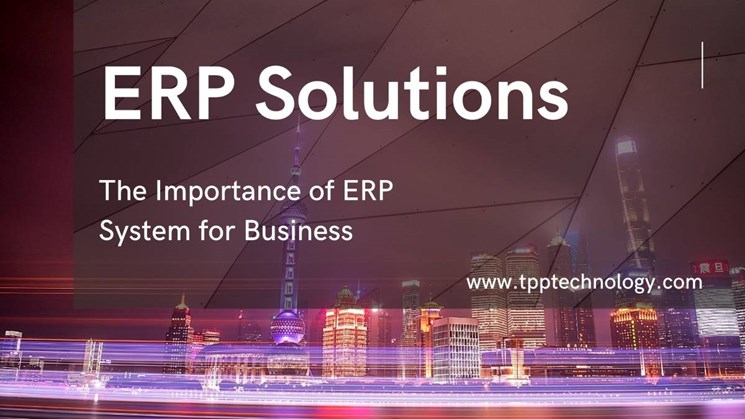
The importance of ERP Solutions for Business
Today, technology is becoming more accessible than ever, where small and medium businesses can acquire advanced tools that are previously available to only large enterprises.
In particular, when it comes to new business strategy of digital transformation, small and medium businesses are now able to deploy the advanced technology of ERP system encompassing production planning, manufacturing execution, together with a host of other advanced functionalities – thus creating a wider field of competition and gain a competitive advantage, compared to those staying behind.
For many manufacturers, an ERP system is a holistic single solution playing the critical center role of their organizations’ system.
ERP system integrates many facets of a business, including production planning, manufacturing, purchase, and finance among other various aspects.
Having one single source of data truth that is available in real-time allows organizations to have visibility into operation, ultimately enhance operational efficiency and boost productivity, as well as reduce costs and improve competitiveness.
Besides, the ERP system enables businesses to optimize processes through real-time data tracking and reporting, together with data sharing between different business units. If your business is considering the implementation of an ERP system, it’s worthwhile to understand the benefits that an ERP system can bring to your business.
How ERP can help businesses to achieve necessary growth
Effectively adapt and respond to market changes:
In the new digital economy where the business climate is constantly evolving, being able to respond quickly to market changes is necessary to stay ahead of the competition. A market-leading ERP system such as SAP, or Odoo is highly robust and effective to help business organizations adapt to new market dynamics and the always evolving customers’ needs.
Moreover, those ERP solutions such as SAP or Odoo are very flexible, allowing for seamless integration with other 3rd party applications that are currently running in the organization’s existing IT environment.
Enhance efficiency and boost productivity:

In the traditional or outdated resources planning system, companies usually employ outdated software, together with manual workflows, and spreadsheets, that are time consuming and as a result, can inhibit business growth.
Modern ERP systems can optimize business operations and centralize the entire business data into one place, to ensure only one single source of data truth exists. This means data and reports become more reliable and accurate than ever.
Reduce overheads
Operating with an ERP system can help organizations to eliminate many inefficiencies which are costly in accumulations. For example, with cloud-based ERP, businesses do not have to invest in additional hardware and maintenance as well as other related IT costs. The overall investment of an ERP system can easily deliver an ROI that easily break-even and multi-times more profitable than investment.
Improve security, mobility, and accessibility
Equipped your organization with an advanced IT infrastructure network, comprising of a modern ERP system hosted in a secured cloud (or on-premise) meeting security standards will allow companies to keep their business data secured from various security threats and attacks.
In terms of a cloud-based ERP system, it increases visibility and allows access from a range of desktop and mobile devices, taking maximum advantage of an ERP system’s capabilities.
Reporting and Analytics
Many market leader ERP solutions such as SAP provides report and dashboard out of the box, allowing employees to quickly have a snapshot of business performance on different metrics. More importantly, instead of having to maintain separate databases and spreadsheets that need to be reconciled manually, ERP systems offer one source of truth only – so that reports can be generated from the system individually and automatically.
The advantage of deploying Cloud ERP is that it offers frequent updates of the most up-to-date technology trends, where businesses can get access to the newest capabilities on a faster cycle, rather than waiting for months or years playing catch up with competitors.
So, if you’re still concern about not being able to keep up with the demand of business evolving due to limitations by using legacy or conventional systems, then now is a good time to transit into a new ERP system.
Implementing a new ERP system can introduce many sudden changes for businesses. However, with proper planning and assistance from the implementation partner, the benefits ERP can bring is tremendous and can be realized almost immediately.
Conclusion:
Today, the ERP system has evolved to encompass a host of necessary features together with advanced functionalities, including Business Intelligence (BI), and Predictive Analytics - while also handling various front-office tasks such as marketing automation and sales automation.
The advancement of cloud computing introduces new innovations at the same rate to address the rise in customers’ demand. Businesses are now moving their many processes to digital and deliver superior user experience, all thanks to the powerful capacities provided by ERP solutions.
As a result, companies, including SMEs and large Enterprises, in various industries - from manufacturing to wholesale distributions and e-commerce - all use ERP solutions.
Even though the term ERP stands for enterprise resource planning - yet, nowadays, many mid-sized firms and high-growth companies also adopt ERP systems, thanks to the rapid rise of cloud computing technology.
With SaaS (Software-as-a-Service), ERP systems become more affordable and easier to use and manage, and most importantly, allowing business data and reports to be readily available in real-time. ERP solutions, therefore, provide management and executives with full visibility into their business, overall enhancing business efficiency and productivity.



